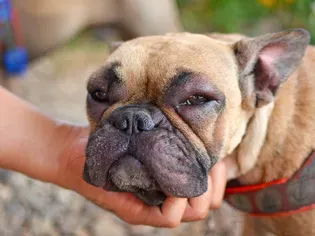Facial Swelling in Dogs
Updated on 05/26/24

Facial Swelling in Dogs: A Comprehensive Guide
Facial swelling in dogs, also known as facial edema, can be a distressing and concerning symptom for pet owners. While it can be caused by various factors, it is essential to seek veterinary attention promptly to determine the underlying cause and provide appropriate treatment. This comprehensive guide will delve into the causes, symptoms, diagnosis, and treatment of facial swelling in dogs, empowering you with valuable information to care for your furry friend.
Causes of Facial Swelling in Dogs
The causes of facial swelling in dogs can be diverse, ranging from mild allergies to severe underlying medical conditions. Some common causes include:
* Allergies: Allergic reactions to substances such as pollens, dust, or certain foods can trigger facial swelling as part of a histamine response.
* Insect Bites and Stings: Bites or stings from insects like bees, wasps, or spiders can cause localized swelling and pain in the affected area.
* Dental Problems: Dental infections, abscesses, or broken teeth can lead to swelling of the face, muzzle, or jaw.
* Trauma: Injuries such as blunt force trauma or puncture wounds can cause facial swelling and bruising.
* Infections: Bacterial or viral infections can cause inflammation and swelling in the face, lymph nodes, or salivary glands.
* Abscess: A localized collection of pus can form an abscess, leading to facial swelling and pain.
* Neoplasia: Cancerous growths or tumors in the face can cause swelling and other symptoms.
Symptoms of Facial Swelling in Dogs
Facial swelling in dogs can manifest in various ways, depending on the underlying cause. Common symptoms include:
* Swelling: Obvious swelling in the face, muzzle, or around the eyes.
* Pain: Swelling can cause discomfort and pain, leading to reluctance to eat or drink.
* Difficulty Breathing: Severe swelling can obstruct airways, causing labored breathing or gasping.
* Drooling: Increased salivation may accompany facial swelling due to discomfort or pain.
* Lethargy: Swelling can affect a dog's overall well-being, leading to lethargy or decreased activity levels.
Diagnosis of Facial Swelling in Dogs
Diagnosing the cause of facial swelling in dogs requires a thorough veterinary examination, including:
* Physical Examination: The veterinarian will examine the dog's face, mouth, and lymph nodes to assess the extent of swelling and identify any abnormalities.
* History Taking: Providing a detailed history of the dog's symptoms, including the onset, duration, and any potential triggers, can assist in diagnosis.
* Bloodwork: Blood tests may reveal underlying infections, allergies, or other systemic conditions.
* Imaging Diagnostics: X-rays or ultrasounds may be recommended to visualize dental problems, abscesses, or tumors.
* Biopsy: In some cases, a biopsy of the affected tissue may be necessary to determine the cause of swelling.
Treatment of Facial Swelling in Dogs
Treatment for facial swelling in dogs depends on the underlying cause:
* Allergies: Antihistamines or corticosteroids may be prescribed to reduce swelling and alleviate allergic reactions.
* Insect Bites and Stings: Anti-inflammatory medications or topical ointments can help reduce swelling and discomfort caused by insect bites or stings.
* Dental Problems: Antibiotics may be necessary to treat dental infections, while surgery may be required to address broken teeth or abscesses.
* Trauma: Cold compresses or pain relievers may be used to manage swelling and discomfort associated with facial injuries.
* Infections: Antibiotics or antiviral medications will be prescribed to combat infections causing facial swelling.
* Abscess: Draining and cleaning the abscess, along with antibiotics, are essential for treatment.
* Neoplasia: Treatment options for cancerous growths may include surgery, radiation therapy, or chemotherapy, depending on the type and stage of cancer.
Prevention of Facial Swelling in Dogs
While not all causes of facial swelling in dogs are preventable, some steps can be taken to reduce the risk:
* Regular Veterinary Care: Routine checkups and dental examinations can help detect and address potential issues before they lead to swelling.
* Vaccinations: Vaccinating dogs against common infections can prevent facial swelling caused by viral or bacterial diseases.
* Allergy Management: If your dog has known allergies, avoiding triggers and administering prescribed medications can help prevent allergic reactions and facial swelling.
* Insect Control: Using flea and tick preventatives can reduce the risk of insect bites and stings.
* Careful Handling: Avoid rough play or activities that may lead to facial injuries.
Conclusion
Facial swelling in dogs can be a concerning symptom, but with prompt veterinary care and appropriate treatment, the underlying cause can be identified and addressed effectively. Understanding the causes, symptoms, and treatment options for facial swelling empowers you to provide the best possible care for your furry companion. Remember, early detection and treatment are crucial for a successful outcome and the well-being of your beloved dog.
Explore More Pets

Basic Training
Puppy and Baby Introductions

Working Dog Breeds
All About Search and Rescue Dogs

Dog Treatments
Puppy Vaginitis: Signs, Causes and Treatment

Dog Adoption
After More Than 1,200 Days in the Shelter, Coco Goes Home

Basic Training
How to Train Your Puppy to Go on Potty Pads

Hybrid Dog Breeds
The Difference Between a Mutt, Mixed Breed, or Designer Dog?

Dog Treatments
Nail Problems in Dogs

Puppies
7 Reasons Why Two Dogs Are Better Than One
